#then when the song cools down at the end it cuts to edd waking up in eddys bed like ''ah fuck'' but not in a bad way
Text
love hearing the most sappy heartfelt romantic songs and going "yeah this is edd and eddy"
#ed edd n eddy#right now its close to you by the cranberries#fuck that one goes hard#there was another one the other week#oh it isnt a romantic song but i was imagining a romantic animation/animatic to it#black market by weather report#in the animation in my head it starts out as normal shenanigans and keeps going until they take some shrooms (accidentally? idk)#and the song starts to shift a little to that one part and they start to get a little homiesexual#and THEN when the song gets to the best part (you know the one) the animation EXPLODES in to psychedelic colors and visuals#and its fuckin awesome#and the cool shit continues and some other stuff happens and its super awesome and trippy#then when the song cools down at the end it cuts to edd waking up in eddys bed like ''ah fuck'' but not in a bad way#hes like ''welp i guess this is the new normal thats pretty cool'' ''...'' ''didnt mean to do all that wow thats embarrassing''#and hes just slowly remembering everything and eventually he decides to just go back to sleep#and the song ends#would be quite cute#also i fucking love that song
1 note
·
View note
Text
In defence of The Long Night and The Bells
[In light of all the backlash and ahead of arguably one of the most anticipated series finale in TV history here is my case in favour of The Long Night and The Bells]
First off, credit where credit is due. Game of Thrones never made it easy for itself in terms of viewer expectations. From a surprise hit back in its first season it grew and expanded into this monster of a global phenomenon. That it is adapted from a pre-existing series of books only adds to fans' distress. The ending of it all is bound to satisfy some and deeply disappoint others. The final season, for all of its hype, is already proving the point. We've seen it happen with the greatest - The Sopranos, Lost, Breaking Bad, Mad Men... - and make no mistake. Game of Thrones IS among the best.

One leader behind whom to rally
Two years of anticipation and a series-long improvement created an immense amount of expectation for The Long Night - and for those who expected it, for the burning of King's Landing. Director Miguel Sapochnik delivers on all fronts and it's totally understandable why he was the producers' pick for these two episodes. From the man who offered us Hardhome, Battle of the Bastards and The Winds of Winter, The Long Night and The Bells could not have been better handled in terms of direction and cinematography. These two outdo the show's own bar in terms of scale and spectacle. Perhaps The Long Night was indeed a bit dark but not everyone was personally affected by it and this works in terms of narrative choice. It's a battle that takes place at night after all. By now, we're used to Sapochnik's down-to-earth approach to battles - once again, there are beautiful shots that follow Jon or Arya during both battles - and of his use of shots from different scenes smoothly flowing into one another - there are several during the final stand of the characters in The Long Night and some in The Bells as Arya and the Hound separately struggle to survive. Improvements could have been made over the feeling of sometimes being overwhelmed by the confusion of the events that transpired during The Long Night and not knowing which character we were following but in the end, that's exactly the spirit. Battles are not nice and clean. They're a complete mess and losing track of your comrades is exactly the kind of thing that would happen. And Sapochnik manages to also instill real terror in chilling scenes like the one in which Arya navigates her way out of a wight-infested library, or a gradually wight-covered Drogon screeching away in fear, or the Hound coming so close to suffering poor Prince Oberyn’s fate so long ago.

At this point, we must pause and commend some really beautiful cinematography, courtesy of Melisandre for a good amount of it. The lighting of the araks was - beyond being a nice way to light up the screen - nothing but epic. So was that of the trenches. And logic aside, the ride of the Dothraki was a spectacular way to begin the battle and it doesn't get any more powerful than those small flickers of lights going out one by one. Talk about getting your hopes dashed. And for all the hellish inferno that Drogon unleashed on King's Landing it made for beautiful shots - there was in particular one aerial vertical shot of the city that was really cool - really, destruction was never this beautiful and horrible. The level of sheer spectacle is unparalleled - at least on TV - and deserves unequivocal praise. Some will argue that it does not come close to the Battle of Helm’s Deep from The Lord of the Rings : The Two Towers, the inspiration for The Long Night. But Sapochnik’s direction is once again a delight to see, proving he delivers Thrones’ battles like no one else. There was arguably the biggest challenge on the series with The Long Night given the expectations and an even greater danger as the closely-kept-secret Bells had to avoid feeling like a repeat. Sapochnik thankfully steers clear of the obstacles, knows how to build the tension needed before the big breaking point and expertly separates the two episodes, not only in terms of lighting but also in the overall feeling, as the latter one resembles much more a deadly massacre than a legitimate fight. A notably striking moment is when a dazed Arya wakes up, covered in ash and painfully struggles to breathe and cough, a harrowing scene that manages to convey the utter devastation brought on the city.
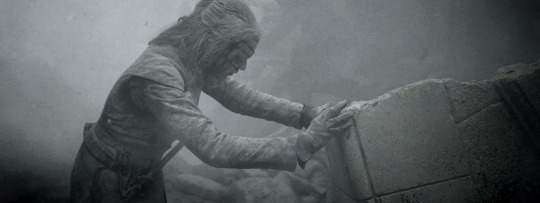
Logics and time constraints were never the show's biggest strengths especially during later seasons but thankfully it was not as pronounced in this two installments. We've mentioned the Dothraki ride. Surprise, we learn later that half of them have magically survived their ill-advised first charge. Why was Ghost not with Jon ? Or the Starks ? Why hasn't anyone considered the crypts might not be safe ? And why didn’t the Starks say goodbye to one another ? How come Daenerys was able to take on the entire Iron Fleet, Golden Company and all the ballistae from King’s Landing if the previous episode showed that she was powerless against just the first ? Why did the soldiers unnecessarily kill civilians in King’s Landing ? These are legitimate but ultimately, minor concerns and thankfully they don’t detract nor do they mean that much in two episodes that had so much more to take care of. Most of these queries find an answer for Doylist if not Watsonian reasons. There had to be trouble in the crypt to give something to the main characters trapped there - even though most of the action scenes ended up cut. Arya sort of waltzed past the White Walkers unnoticed for the killing blow but that was the whole point of her training with the Faceless Men. Moving swiftly and silently is as much a skill she gained as wearing faces. And killing civilians in the heat of battle seems like an entirely possible thing, even it is horrible.
For whom the bell tolls
Thrones has arguably acquired a reputation for not shying away from killing off its main characters. Others have done it before and frankly, better. While that has been a staple of the show in its early years, it has largely avoided it in its later seasons, shielding its fan favorites with thick plot armor. So many times in The Long Night, viewers saw what could be the end of this or that character - except it wasn’t. As such, anticipation of a bloody final battle that would off many beloved characters was stunningly squashed when the dust finally settled and we ultimately bid farewell to important - but not vital - players. Perhaps that’s another way of subverting viewers’ expectations but it mainly leaves a sour taste of ‘really...?’ Perhaps this was done on purpose to better shock afterwards, given how The Bells subsequently played out. There’s no doubt now that characters like Jaime or the Hound escaped unscathed from the battle of Winterfell because they were needed for the sack of King’s Landing. But unless the finale surprises, the survival of others like Tormund, Pod or Brienne is quite dubious, given how their roles are essentially over.

But while the unceremonious killing of Rhaegal at the hands of Euron, a character so frustrating that seeing him be done with by Jaime was really THIS satisfying and Missandei’s death left a lot to be desired - most viewers expected half of the Missandei/Greyworm pairing to perish during The Long Night and were pleasantly surprised when both survived, only for her to die in such a disrespectful way in the next episode - the treatment of the casualties in The Bells is at least done properly and on this domain, The Long Night really wins. Melisandre, Edd, Beric, Theon, Lyanna Mormont and Jorah are really given time to make the most of their last - even if brief - moments, going out in respectful ways that complete nicely their arcs. Melisandre’s final appearance, in particular, signals a certain direction in the end of the overall story as it happens right after the annihilation of the most powerful supernatural force in Westeros, perhaps heralding the end of an era in which magic still played a large role. The acting must also be praised, especially on the part of Alfie Allen and Iain Glen who really shined in his last scenes with Emilia Clarke.
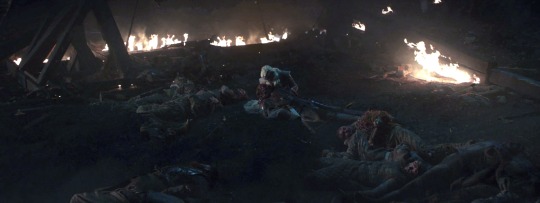
Sapochnik also deserves some recognition for his ability to strike a proper balance between battle scenes and more quiet moments, allowing character development in an otherwise epic but mostly dialogue-free spectacle. In doing so, he effectively avoids what he calls ‘battle fatigue’, the moment where audience becomes tired because a battle gets drawn out. No character feels left out although with a longer episode or season, we could have seen more of those we didn’t follow that much (Tormund, Pod, Gendry...); it is also a pity that scenes like Tyrion and Sansa killing wights ended up on the cutting floor but their interactions make up for it, offering the episode its best lines - and arguably its best character moments. The narrative naturally focuses on Jon and Daenerys as the leaders but in an interesting way, they are rendered pretty useless and relegated to the roles of helpers more than defining victors. But even so, the episode makes a point in checking with each major protagonist even for brief moments that nicely go beyond mere fighting (Greyworm being torn over abandoning his Unsullied men, Brienne and Jaime saving each other, the Hound’s fear of fire...) But the night ultimately belongs to two players; the Night King, who dominates the episode as he crushes Winterfell’s defences and thwarts off all attempts against him by both Jon and Daenerys, and Arya Stark, de facto Princess Who Was Promised.
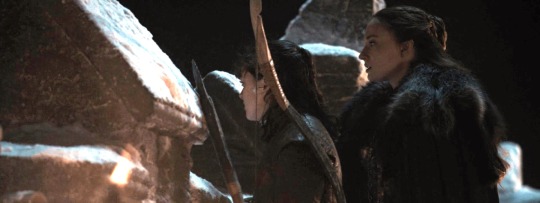
The song of Ice
This season has largely respected Arya’s character development and storyline, tying it nicely into the current narrative and has finally started giving her some sense of humanity after the show had her dangling for way too long on the edge of becoming an emotionless killing machine. In addition to some callbacks to her past (’Stick them with the pointy end’, ‘What do we say to the God of Death?’, ‘Not today’) The Long Night continues Arya’s progress towards finding herself and in the process, manages to shift from mere spectacle to the continuation of a personal journey for a young woman who learns to fear Death once again, and reverts to fighting not just for the sake of fighting but for her life. Maisie Williams conveys this change well and the scene she spends in the Winterfell library is chilly enough to make you on edge. The beauty in this is that Arya’s intertwined storyline with other characters such as Beric and the Hound also furthers their own; the former fulfilling his destiny and the latter finally confronting his fear of fire for the affection he feels for his former protegée. Arya is thus the one to kill the Night King, a twist unpredicted by almost all (but as evidenced by Melisandre, foreshadowed) and very satisfying in terms of narrative because it nicely surprises viewers but also ties in with the character’s evolution. Arya has increasingly been vocal about the importance of her family; evidence of this is seen when she firmly stands by her sister this season. Had Jon done the deed and fought off the Night King, we would have been treated to a swordfight of epic dimensions but that would have ultimately detracted from what Arya’s presence brings. Not only does she use the Valyrian dagger that almost killed Bran - and started this whole series of unfortunate events - and use it with her signature move, but the show frames it as if she’s largely doing it for her brother who was seconds away from suffering an apathetic death. The look she gives him afterwards really conveys the love that Arya is finally feeling back for others. Family is however still not enough and it takes the Hound again to put Arya on the final steps of her path two episodes later.
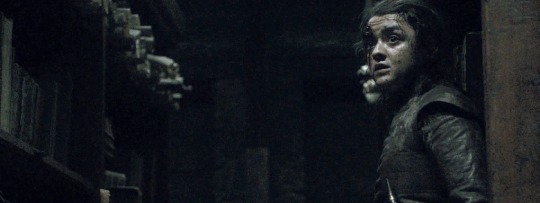
The most recurring complaint about The Long Night was how quickly and sudden the threat of the Night King was dealt with. Most viewers agree that had more episodes been available, a season-long storyline dealing with the Long Night would have been possible, or even splitting the battle in two episodes. But we got what we got and yes, it was all over over the course of one night. A large amount of complaints have been directed at the fact this danger was presented to us in the very first scene of the show, how the White Walkers were seemingly the ultimate enemies to defeat, how in one episode it was all solved and how it was so easy to do so. That’s forgetting many things.

It's a show called Game of Thrones. Adapted from a series of books called A Song of Ice and Fire. So no, the threat of Ice was not the whole point of the show. Nor was it for the books - it's only half of it. And the show’s title only reminds all that the whole story revolves around that iron chair and who will get to sit on it in the end. The battle was certainly not easy and not quick. There was no doubt that good would prevail because the threat of Ice was always a ‘good versus evil’ ripoff. We knew they'd win. But it certainly wasn't an easy win and in saying that White Walkers were introduced since the beginning, viewers will need to remember what that implies; that they were there during the whole series and that each time they appeared they won. Hardhome? They won. Pursuing Bran and killing the Three Eyed Raven? They won. The Fist of the First Men? They won. The wight hunt? They won. Last Hearth? They won. So at this point, Winterfell WAS going to win. It might have taken a single night of resistance but it was the culmination of eight seasons of knowledge slowly gained to better understand them and give a proper fight and it wasn’t an easy process. Each former battle against the White Walkers (or any other battle during the course of Thrones for that matter) lasted several hours at most or less than a night. So did the Battle of Helm’s Deep. Expanding the time would perhaps have been more true to expectations and the stakes raised, but would have thrown the episode into the ‘battle fatigue’ effect Sapochnik and the producers wanted to avoid.
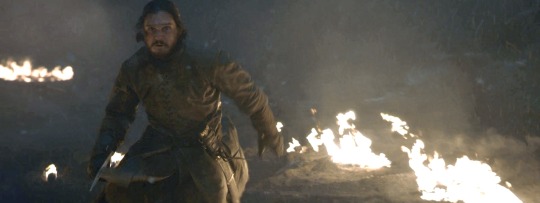
And once again, Game of Thrones pulls the rug under our feet. That's the beauty of it. The show has always been about subverting our expectations. By presenting Ice as the first real danger we were exposed to, it made sure that we'd focus on it and conveniently forget the other half. Just in time for ...
The song of Fire
George R.R. Martin has famously said that the title for his series is about the threats of ice on one side and fire on the other. Yet this has somehow eluded most viewers and the show played this at its advantage to pull off its most massive twist - hiding the fire part of the equation in plain sight and worse, having us root for it. And we thus come to the main complaint about The Bells - how ‘Dark Dany’ was out of character, character assassination or too rushed or too sudden. It was not. It's been staring at us since the beginning and we were all blinded. Feminism ! DRAGONS ! Female power ! Dracarys !
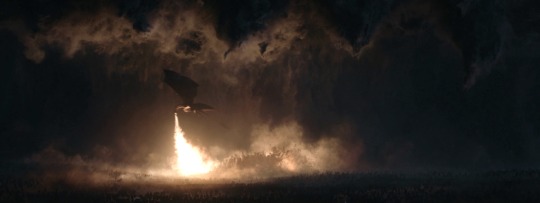
It's been executed in the most perverse, painful, knife-twisting manner and in some way, it's such a Game of Thrones move. That's the whole sadness of it. Back in the day, Lord Eddard's demise and the likes of the Red Wedding suddenly slapped viewers in the face all over the world and taught them what a classic Game of Thrones move was. From then on, we were on guard, ready for the most gut-wrenching plot twist and it kind of stripped the magic away. But surprise-killings aren’t the only way to hurt viewers and trick them. And now that the show pulls another twist of a different kind, we refuse to see for what it is. But the subtlety of it was laid out as early as Season 1. The evolution of Daenerys as a tragic character has been carefully crafted to be the biggest betrayal on the show. She starts off as a girl with no agency, sold into marriage and raped - ensuring our immediate sympathy. Then she turns the tables and proceeds to do it in a cool, badass way. And dragons are made to burn things right? So when it finally happens we're sold. She liberates slaves, she wants to create a better world, she keeps winning and winning and winning. What could possibly go wrong? Well, Westeros is what could go wrong. We've seen her storyline on a pretty constant rise all the way through Season 6, with only minor setbacks so it should follow logically - in terms of narrative excitement - that she would next fall. And indeed it is Season 7 that amped up the negative side of her character in a way previous seasons simply slipped it past us and that is generally then that the ‘Dark Dany’ theory picked up the most steam. The tragedy of Daenerys is that she's not an inherently bad person. Calling her Mad Queen is reductive and annihilates any complexity her character possesses but it is unfortunately a catchy nickname. But Daenerys is not mad. She is not crazy. But when she snaps she is not as sound and sane as she'd ideally be. She is the unfortunate product of her own storyline and that storyline is nothing but sad.

To comprehend why Daenerys has come to this point we need to remember that:
Burning has been a favorite thing of her since, well.. since her dragons could burn things. And even before. That's her favorite weapon, the one which always works and solves problems. That's also her strength as she subjugates people through fire. During her time in Essos most viewers had no issues with fire as a weapon. We had a mostly detached approach to it and we were concentrated on Daenerys' POV. And then Season 7 happened and suddenly we were on the other side - the receiving end of death by fire. And it was horrible. Yes she fights with dragons because she has them. Why not use them? That's her biggest asset. That's how she instills fear in people and how people instantly respect her because otherwise you’re roasted. Now fire as a weapon is an awful means but as demonstrated with wights it can be a positive thing. Just not on humans.
Burning cities is not a new idea. She has mentioned it as early as Season 2 at the gates of Qarth and it has appeared in conversations during Seasons 2, 5, 6, 7 and 8. Most of the time she refrained from it because she actually could not do it yet or because someone else talked sense into her.
She had everything and she lost everything. Her time in Essos shaped her, built her and it raised the bar too high for herself. As she said, she had love there - the slaves she liberated adored her, recognized her deeds and worshipped her. The cities she conquered, the Dothraki, the few people from Westeros who came to her to swear fealty, it all created a false sense of expectation of what would happen in Westeros once she set foot on it. Only it was the biggest disillusion of her life and the biggest irony. Exiled on a foreign continent where she rose the highest but didn't want to stay there and once she finally gets on the continent she wants to be on, it's all over. Jorah once suggested that she settle for a peaceful life far away and she refused. Already she set herself on her own fateful path.
She has come full circle to having no one. Throughout the whole show Daenerys built herself a second family consisting of people she trusted and who - unfortunately - propped her up more than they gave her real advise, fueling further her sense of entitlement. Daario encouraged her to execute people, Jorah and Ser Barristan admitted that innocents ought to die in wars and Missandei’s last words are nothing but the continuation of this trend, the latest in a series of ill-advised words of council. And now ? 'A Targaryen alone in the world is a terrible thing'. Season 8 has not been kind to Daenerys as she has lost Jorah, Missandei, her second dragon and half of her armies. Then she learns that the man she loves is actually another contender for the Throne and that perhaps he didn't love her at all. Her remaining counsellors, she doesn't trust or she doesn't listen to because they question her decisions or act in ways she doesn't approve, something she's not used to.
She feels betrayed by Jon. Their last scene together in Dragonstone seemingly puts an end to the relationship as Jon’s behavior reveals he cannot return her feelings - anymore? Or did he ever have feelings at all? Daenerys’ take on their couple was already flawed as she had no right to ask him to keep, not just any secret but his entire identity, hidden from his own cousins. But her final words to him - ‘All right then. Let it be fear’ - are revealing of her state of mind and her acceptance of the fact that if she can’t make people love her, they will at least fear her; words that are foreboding of what happens later and also to be contrasted with a famous quote - from the books - where Sansa thinks to herself ‘ If I am ever a queen, I'll make them love me’. Notice that in this episode she once again wears a three-headed dragon pin and chain and that her hair does not cover it anymore; she had it either hidden behind her hair or taken it off entirely in previous episodes.
She's unhinged. All of the factors mentioned above are enough to make somebody snap. Daenerys is a benevolent person at heart but her ambition has always been greater and her pursuit of the Throne has clearly overshadowed the better aspects of her personality for at least one season now. It's doubtful she came to King's Landing with the intention of killing thousands of innocents. But the culmination of her losses combined with her earlier resolution to revert to fear if she can't have love is enough to explain her behavior. Does it justify it ? No. But she is only a human after all.

That's not saying that is was executed perfectly either. It's no secret that Thrones had a big problem with time during its last two seasons and one can argue that crafting two shorter seasons was deliberately walking itself into these problems. While The Bells and The Long Night thankfully aren't affected that much, they suffer from the consequences of those time constraints. The battle against the White Walkers has been a sure thing since the beginning of the show. Yet the storyline finally started to really revolve around it only during two or three episodes at most. Arguably Jon's Season 7 storyline was all about it but the urgency of it only kicked in during Season 8 and compared with Daenerys' downfall, it was still spread throughout 3 episodes. The final unraveling of Daenerys essentially took place over the course of only one episode. That's not saying that the path wasn't laid out beforehand; just that some more time spent witnessing Daenerys go from bad to worse would have helped. At the end of The Last of the Starks Tyrion mentions that Jon will take weeks to reach the South. When The Bells begins he has arrived and we see Daenerys in the most despondent state we've ever seen her. Seeing that evolution would have been helpful.
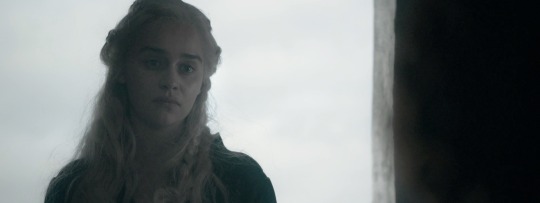
Daenerys is in the end like all characters on the show, not entirely good and not entirely bad. She is capable of empathy, love, respect, kindness, fighting for goodness and at the same time, able to display ruthlessness, coldness, entitlement, stubborness, joy in inspiring fear in others and giving in her worst impulses. What makes the pill so hard to swallow is how Thrones portrayed her in the majority of its course before seemingly veering away a bit too abruptly. But the foundations were always there; Thrones just chose to carefully disguise or mask them until the very end. The choice will likely remain controversial in the years to come. And that’s not even the first time that happens. During Season 7, Arya and Sansa were stuck in a badly received plot which seemingly pitted sister against sister before it was revealed in the season finale that this was actually a big play to corner and execute Littlefinger. On paper, the trick must have worked wonderfully; on screen, it was at best frustrating, at worse infuriating because the reveal only came at the end, which hardly helped explain the Stark daughters’ actions all season long. Daenerys’ turn is only a larger example of this, spread throughout the whole series instead of a season.
Before you embark on a journey of revenge, dig two graves
Fans of Revenge will be familiar with this quote but one can’t help but think of it; it actually applies well for The Bells as a nice way to analyse how different characters behave in the episode.
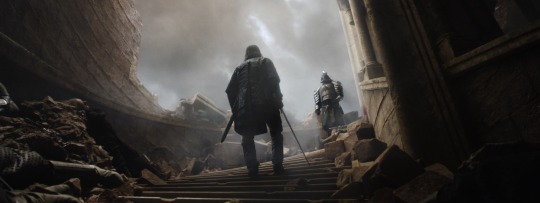
The most obvious example is for the Hound and the Mountain who finally come to the long overdue Cleganebowl. The final face off between the two brothers has been a long foreshadowed event, anticipated for seasons now and a rather thick plot armor that shielded the Hound from any untimely demise he might have suffered otherwise. With so many expectations regarding this specific fight, it thankfully delivers but it's the end that is the most surprising. The Hound has gone through one of the most beautiful character developments on the show to the point of him becoming a fan favorite. So of course against the Mountain we naturally root for him. And he is ultimately stronger than his brother. Unfortunately for him, few things can kill his zombie sibling now. But the climax of the fight is one that ultimately is a sad, though fitting one for the Hound. Losing him hurts but beyond that, one must recognize there was no other ending for him. The man was not a good man. A flawed one, a redeemed one? For sure but as he told Arya, he's been consumed with revenge all his life. His whole existence was built towards one goal - killing his brother. Confucius’ philosophy applies here; the Mountain would have died like Cersei regardless of the manner. But the Hound was so consumed with it he couldn't let go of it. That the two characters die together is a testament of how intertwined they were; that they tumble down into a brazier is ironic and puzzling given the character's fear of fire but one can indeed read this as poetic as well.

In the end, the Hound was destined to die. More than Jaime - who had a shot at surviving beyond these final battles - the character had literally no purpose for the aftermath. He had made peace with those most important to him (Arya, Sansa, Beric, Tormund), learnt and accepted that he could fight for good and come to the closest thing to love for another being he could achieve. The climax of his overall arc comes through a touching scene with Arya to whom he imparts this piece of wisdom on revenge, and in the process finally restores some humanity to the girl who had come so close to become an emotionless killing machine, as consumed with vengeance as he was. She in turn calls his name for the first time, signifying his importance to her. Arya has been without any parents, without any guiding figure for a long time, during what should have been her most crucial, formative years. Sandor was perhaps the closest thing she had as a father figure - not an ideal one but one nonetheless.

Furthermore, the contrast between Arya who chooses to give up on her quest for revenge and Daenerys who instead gives in, is food for thought, especially ahead of the series finale. Another character we should be worried about is the grief-stricken Greyworm who throws whatever is left of his soul into the battle for his Queen, mercilessly slaughtering foes who had literally surrendered before his eyes. And the Northern forces, so far portrayed as good, are seen participating alongside foreign warriors in arguably Westeros’ most horrifying event since the first sack of King’s Landing. Jon, who gets a jolt of character consistency back, unsuccessfully tries to restrain his men, being noticed in the process by Greyworm. He goes on to save a woman from being raped by one of his own men, in a scene curiously reminiscent of the Hound’s rescue of Sansa during her near-rape scene in Season 2. In any case, the series finale will show us how Greyworm’s story ends but from what viewers can see, it’s not going to be pretty.
The things we do for love
In an episode that features another pair of siblings reuniting for a different purpose, a nice contrast can be drawn with the Lannister siblings. Similarly to Daenerys’ treatment, Jaime and Cersei's ending drew controversy as to how the deed happened and how their character development seemingly flew out of the window. Viewers were arguably distraught over Jaime's actions in The Last of the Starks where he seemingly completed his journey away from his sister by finally getting with Brienne, the one character instrumental to his redemption, only to leave her at the end of the same episode (though they will want to remember again that the episode spanned over several weeks). It was difficult to accept that after so much time building up his redemption, so much difficulty to get away from Cersei, the show would revert to push him back into this toxic relationship.
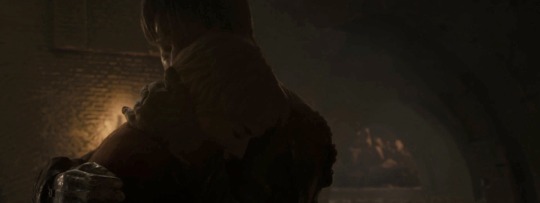
But that's forgetting who Jaime is as a character and that's also forgetting what show we are watching. Like the Hound, Jaime is not a good man. A redeemed man ? Yes, we could arguably give him that. But if we need it (and we do) he reminds us himself; he is a man who pushed a boy and crippled him for life, a man who murdered his own kin, was willing to kill thousands, just to get back to his sister/lover. This is a man who also saved millions of lives (and though he somehow proceeds to tell us he never cared for others, it curiously does not contradict it that much; one is perfectly capable of not caring for others while at the same time recognizing that genocide is inherently a bad thing), a man with a code of conduct, a man of honor and this duality in the character is its whole richness. A Jaime that finally lands on one of the two sides loses its appeal. The Jaime that ends up happily ever after with Brienne, a woman he recognizes is a better match for him, is nothing but wishful thinking. There was never going to be a happy ending for him because he is far too complex a character to have a fully defined ending. He is hateful like his sister, hateful of himself and he feels he hasn't earned his happy ending and he's right. His last act is one of love though, as he makes sure Brienne does not follow him into the grave, even if that hurts her in the process.
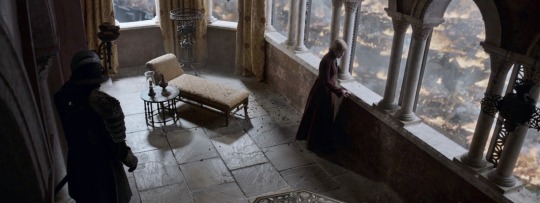
Ultimately, Jaime is not the Valonqar, the little brother who would slay Cersei. He doesn't return to King's Landing to finish her, he returns to King's Landing to be with her. Because in the end, that's the essence of the two of them. Come into the world together, gone from the world together - fitting and poetic. The relationship was toxic but as many have pointed out, the longest and most stable in the entire series and however damaging it is, such a relationship is hard to get rid of. The show ironically follows a rather realistic approach here. In an episode that features Thrones' own version of the end of the world as they know it, Jaime and Cersei dying together is very much in line with who they are as characters. Nikolaj Coster-Waldau and Lena Headey's acting once again must be commended because they really sold it this well. Headey remains Thrones’ most powerful actress, gradually going from confident and - as always - blind to what literally happens before her eyes to a sad, despondent state as realization finally creeps in. Interestingly (or perhaps intentionally) this specific episode portrays Cersei in a rather sympathetic light (notice that nowhere during this episode does she wear the crown or her armor), the image of a woman who sees the last of her world crumbling down, which draws viewers' pity on a character previously so reviled due to her past actions they wished her dead sooner rather than later. And yet, during this penultimate episode she seemed rather powerless to do anything about the inferno that rained down from the sky.
Here be dragons, fire and blood
That the episode is so well-crafted and enthralling helps hide the weaknesses in these developments. When focusing on the characters only, Jaime and Cersei ending together is fitting. Narratively and in terms of the wider story, it seems to make little sense, that much everyone agrees on. Or does it? Quid of the younger more beautiful Queen? What of the prophecy that said Cersei would be undone by her brother? Well, if we want to twist the facts, Jaime did lead his sister under the city where they died when everything crumbled around them so in a way, he is responsible for her death and so is Tyrion who freed his brother in another instance of ‘things we do for love’ so that he could join their sister. The scene in question is a reverse of the one where Jaime previously set Tyrion free at the end of Season 4, with both times, the former prisoner going on to kill a family member, directly or not. But Cersei deserved more than this kind of death. One could draw a parallel between her most infamous action - incinerating her enemies trapped in an exploding building - and the fact that she now dies trapped in a crumbling structure, a parallel that brings The Bells even closer to The Winds of Winter when you remember that the last time bells rang in King’s Landing, it was also to signal the beginning of an unknown yet horrific event.

But that's hardly enough. A gruesome execution was not necessary as wished by some fans - indeed, an execution by Daenerys would have been too much and once again, the show keeps in line in denying us and the characters what they want - but a death more fitting for the character would have been preferred. Cersei was never a warrior. She took down her enemies through scheming, and devious plans. She relied on her wits. That in the end she would be taken down by an enemy that proved too great for her was a given but most fans bet on Tyrion or Sansa who also use their intelligence to outdo their foes, which would neatly explain why these two reconnected and were put on the bench during The Long Night, and why their action scenes were cut - because they were to be instrumental in the downfall of their mutual enemy. They also would have tied nicely into the prophecies surrounding Cersei, Tyrion as the Valonqar and Sansa as the younger more beautiful Queen. And what an absolute irony that would have been if Cersei had somehow groomed her replacement herself. A final confrontation between Cersei and Sansa would have been fantastic. Instead, the show pits Cersei against an enemy she is not on equal footing with, the cinematography illustrating it quite literally as the screen alternates between two women dressed in red, one high in her castle, the other even higher on the back of her dragon. Cersei dies, not at the direct hands of any of her brothers, nor those of Sansa or Arya (whose presence in the city is in the end, not to kill Cersei but to amplify the empathy we feel for the inhabitants that she joins in trying to escape the burning capital), and not even those of Daenerys. But the result is quite straightforward; for all the preparation, all the fighting back, all the defence you can do, all the mercenaries the Iron Bank (remember that ?) can get you, you're no match for a dragon. How frustrating.

Let's stop and talk about those dragons now. If Drogon alone is capable of removing all the ballistae and the entire Iron Fleet by himself, what was the point of killing Rhaegal then ? Evening the odds is not even a working answer now since we can see that even down to one dragon, Daenerys is clearly overpowered. In doing so, we're treated to a frustrating, illogical death and we're denied a more proper death during The Long Night (if Rhaegal really had to die) or a Dance of Dragons with Jon claiming him (what was the point of Jon flying him if it didn't come into the plot later on?) and fighting off with his aunt. The so-called Dance of Dragons, over which so many fans theorized for years, has instead been adapted for The Long Night as a fight between two surviving dragons and their undead sibling. [Let’s pause a bit now. At some point, Drogon and Rhaegal are flying through a storm and nearly crash into each other, conveying the sense of disorientation and blindness surrounding them. How cool would it have been if we then saw Viserion fly by, circling them but only seen in glimpses?] In any case, the fight-off happens and the whole sequence deserves high praise. Sapochnik’s use of close shots is smart and the night setting does really help - some wider shots in subsequent episodes taking place in daylight betray the use of green screen - but it’s really the sound department that has to be commended for effectively conveying the violence of a gruesome fight and generating empathy for a fantastical CGI beast crash-landing in pain.
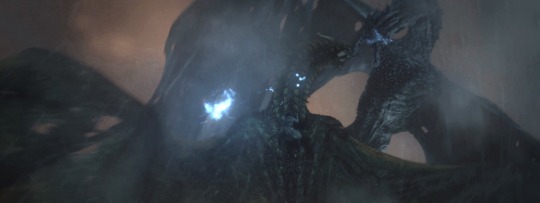
And another one behind whom to rally
Aside from Miguel Sapochnik who made the best direction possible for these two episodes, there is at least one other man fans will agree has been consistently good and that man is Ramin Djawadi. Thrones' composer has elevated the music each year and this final season is no exception. The new piano piece The Night King has already shot up to stand firmly beside Light of the Seven as another one of Djawadi's iconic pieces, widely recognized as an instant masterpiece that really did serve the episode well, even if it apparently bears some resemblance to the man's work on Westworld. Piano has been used sparsely in the show, appearing for the first time for Light of the Seven, a cue so widely praised and recognized it generates far more applause during the live concerts that the composer performs than any other cue. Its use here signals once again that something is going on. Like Light of the Seven, The Night King builds slowly to its climax but where we diverge is that in the former, the end is already known as Cersei's wildfire plan is divulged on screen, whereas in the latter we have no idea if the Night King is going to kill Bran or not. It's another proof of the excellence Djawadi offers on the show. The rest is equally thrilling, with the use of electronics and drums to underscore the battle scenes - instruments largely unfamiliar to aficionados of Thrones’ much more violin-dominated score. Djawadi has come a long way since the beginning of the series. Now at the end of it, he has no difficulties in proving his mastery of the themes he composed, effortlessly blending and intertwining them at will. Needle, Ironborn, Vaes Dothrak, Dracarys, Lord of Light... all these character cues appear at one point during The Long Night whether subtly or taking the front, rising dramatically throughout the episode before its stunning conclusion.
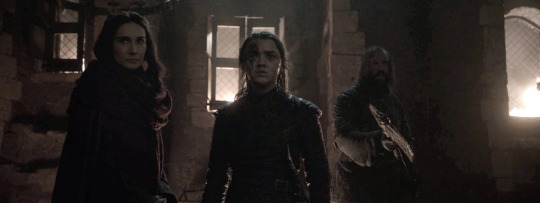
But if The Long Night arguably boasts from featuring The Night King, Djawadi's Season 8 masterpiece, The Bells displays another range of the man's skills. In this crucial episode where so many characters take turning points, Djawadi shows how shrewd he is and - in a poignant and devastating way - how easily he can manipulate music at will to serve the story. With Daenerys' dedicated cues, Djawadi apparently - knowingly or unknowingly - participated in the series-long deceit over the character. The score for Daenerys mirrors her journey in the show, starting quiet during Season 1 before gradually growing, incorporating more and more militaristic drums and grand fanfares. It has been instrumental in pushing viewers in one direction - the one where Daenerys was believed to be the hero of the story. Djawadi's score in Season 7 - the beginning of the end for Daenerys - continues to illustrate the point. Most of the character's musical cues continue the trend of majestic grandeur and heroic action while also introducing the beautiful Truth theme but it's in The Spoils of War - the sole Daenerys cue underscoring her so far only real war interaction with Westeros - that things become interesting. During the scene, Daenerys' forces fight against the Lannister armies and while it is a resounding victory for Daenerys, the score pushes viewers to an unsettling feeling as it intertwines Daenerys' triumphant cues with a more sorrowful rendition of The Rains of Castamere. Viewers are meant to sympathize with Daenerys' foes and the show clearly frames the horror that has been unleashed upon them by lingering on shots of people dying in atrocious pain as they burn alive. For the first time, Djawadi starts directing the audience somewhere else. Where the music seemingly follows what the show went for is the prominent use of positive music revolving around Daenerys while offering literally no negative counterpart. Furthermore, Djawadi is no stranger in using silence in the show, usually following a very intense moment, as a way for viewers to process the action on screen. But silence is as meaningful in other areas and Djawadi expertly knows when to use it. Notice in Season 7 how Truth permeates literally every scene Jon and Daenerys share - a not so subtle way of presenting their love story. In Season 8, the theme returns once in the first episode. Afterwards, nearly all of their scenes together are silent. Djawadi refrains to score them to convey the message that these are no more romantic, that there is no positive subtext there. The cleverness of the process is that Djawadi never tried to help presenting any negative Daenerys scene too overtly. Looking back to Season 7 for example, none of her scenes where she appears in a rather negative light (not listening to her counsellors, her stiff first meeting with Jon, her threatening Varys...) are scored, or otherwise they feature only small unsignificant variations. Djawadi uses silence instead of an overtly negative version of her themes, a cunning way to serve the story's interest in not alerting viewers of Daenerys' downsides. In The Bells, he finally allows himself to twist his themes into deformed, unsettling, almost malevolent versions. Truth thus returns in an altered state that conveys no romance at all anymore and Daenerys' learning of Varys' betrayal is underscored by an eerie take on her former theme Reign. In doing so, Djawadi's music mirrors the path the show took for Daenerys' character arc - deceiving viewers during almost the entirety of the show by amping up Daenerys' positive aspects while refraining from overtly showing the rest, only to finally unleash it at the very end.

What's interesting in The Bells, when compared to The Spoils of War, is that Bells removes Daenerys' POV completely the moment she starts burning the city. This is mostly done to side almost exclusively with the citizens of King's Landing and the protagonists who must survive the catastrophe (Arya, Jon, Cersei, Jaime...) whereas Spoils still balanced between Daenerys' POV and the Lannisters' POV, which allowed Djawadi to mix the triumph of the former with the sad ending of the latter. In The Bells, the sacking of King's Landing is entirely scored by sad, tragic variations of character themes with a minimum use of battle score since this is actually no battle. There is thus no victorious cue either. Instead, the score focuses on the Lannisters, the Hound and Arya. Jon’s theme is also absent, signifying his current state of mind and the uncertainty about who he is. The Rains of Castamere and Light of the Seven notably return with new variations that add a sense of tragedy and ending romance that really help the last scenes Jaime and Cersei share together. I Choose Violence accompany Cleganebowl and Jon sounding retreat features a desperate version of the main theme while Goodbye Brother's sorrowful notes end the episode as Arya, free of her desire of vengeance, can finally be Arya Stark again before seguing into a mashup of the Lannister theme again during the credits. For all the controversy surrounding the episode, Djawadi unanimously displays masterful work.

In the end, The Long Night and The Bells may go down amongst the most divisive episodes of Game of Thrones. They may be the flawed culmination of the show's main arcs, defying expectations in thrilling, exciting but also painful, twisting ways but they definitely represent what Game of Thrones is - a global phenomenon that went far beyond anything that could have been predicted and which will inevitably please some and disappoint an even greater amount of others. ‘If you think this has a happy ending, you haven't been paying attention’, Ramsey once told us. This should be a guiding thread for the final surviving characters' storylines and make us wary for the series finale.
#got#game of thrones#ramin djawadi#daenerys targaryen#jon snow#arya stark#sansa stark#jonsa#cersei lannister#jaime lannister#tyrion lannister#brienne of tarth#sandor clegane#theon greyjoy#sophie turner#emilia clarke#lena headey#maisie williams#kit harington#nikolaj coster-waldau#game of thrones meta#got meta#got analysis#game of thrones analysis#got 8.03#got 8.05#got 8x03#got 8x05#game of thrones thoughts#got thoughts
736 notes
·
View notes